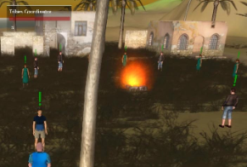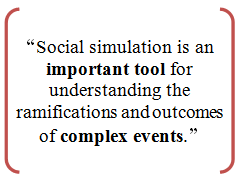Using Games to Address Real-World Issues

The SUDAN GAME
via USC GamePipe Laboratory
A new article in Simulation & Gaming studies an avatar-based game that addresses a real policy challenge: peace in the Sudan.
The game, under development as part of a massively multiplayer online game at the University of Southern California’s GamePipe Laboratory, casts players as tribe members who can directly impact stability in an interactive model of the country:
…[W]e are proposing that intertribal hostility in Sudan can be understood as a function of differing perspectives on a variety of beliefs. To measure the stability of the country at a given point in the simulation, we calculate the average of each of the eight beliefs across the agents within each tribe. We then normalize these beliefs to be between 0 and 1, and calculate the differences between each tribe…The purpose of the Sudan model is to determine if a sequence of interventions could be carried out in Sudan to foster common beliefs among the tribes, decrease their differences, and thus increase the stability of the country as a whole.
 The game has some unique attributes that should make it a valuable tool, according to Kathleen Carley of Carnegie-Mellon University, an author of the paper. “A major problem with games and with agent-based simulation is that they are very time consuming to instantiate,” Dr. Carley told Management INK. “Another major problem is that they are very difficult to repurpose for another issue. This work shows how it is possible to link a massive multiplayer on-line game and and agent based simulation and then use readily available news data to instantiate generic characters. This paves the way for auto-instantiation and repurposing.”
The game has some unique attributes that should make it a valuable tool, according to Kathleen Carley of Carnegie-Mellon University, an author of the paper. “A major problem with games and with agent-based simulation is that they are very time consuming to instantiate,” Dr. Carley told Management INK. “Another major problem is that they are very difficult to repurpose for another issue. This work shows how it is possible to link a massive multiplayer on-line game and and agent based simulation and then use readily available news data to instantiate generic characters. This paves the way for auto-instantiation and repurposing.”
Read the article, “Games, Social Simulations, and Data—Integration for Policy Decisions: The SUDAN Game,” published by Peter Landwehr of Carnegie-Mellon University, Marc Spraragen of USC, Balki Ranganathan of USC, Kathleen M. Carley of Carnegie-Mellon University, and Michael Zyda of USC in the in the February issue of Simulation & Gaming, a symposium on simulations, games, and peace.































































































